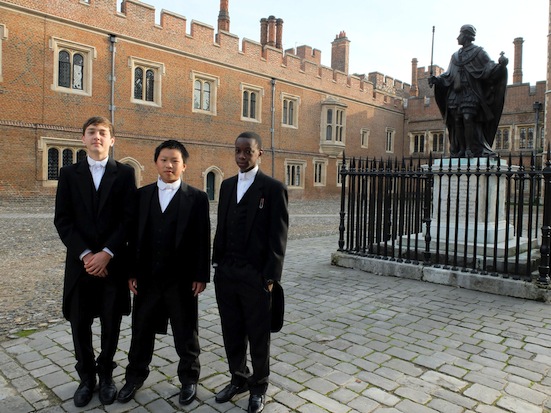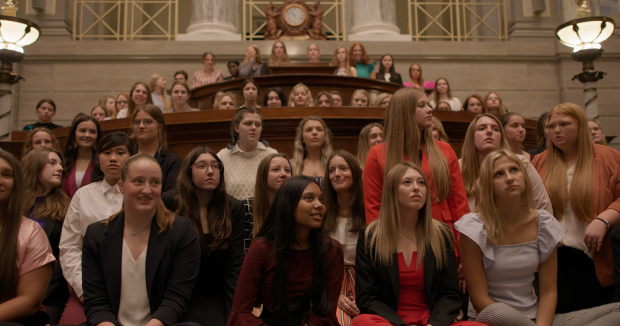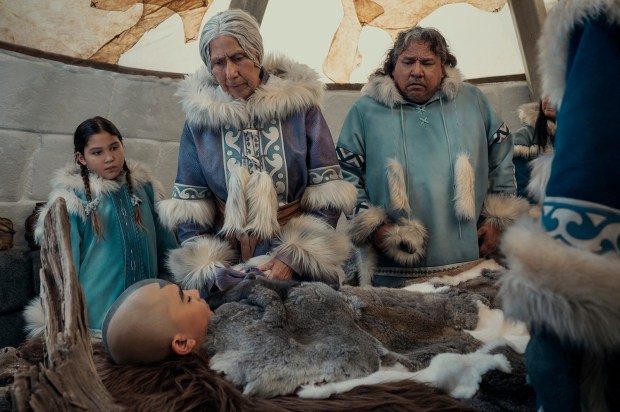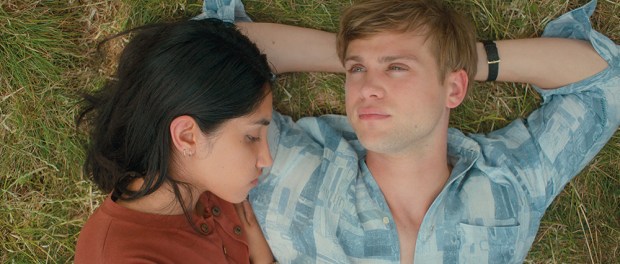One of the stranger things about Eton is its near-total lack of class snobbery. Yes, all right, you still get the occasional away match where their supporters will chant at the opposition ‘You’ll be working for our Dads’ but that’s just badinage, not animus.
I doubt it was always thus. Probably there was a time when every Etonian was acutely aware of which of his housemates was in line for a dukedom and which a mere baronetcy. But, as far as I can tell from my own experiences as an Eton parent, those days are gone. Today Eton is quite ruthlessly meritocratic and if you’re good enough you’re good enough, regardless of whether your Dad owns a Chinese takeaway in Leigh-on-Sea or he’s a jumped-up blogger from Brum.
This fact probably came as a bit of a surprise to the BBC when it sent a crew to film three new boys over a term (or rather a ‘half’) for CBBC’s documentary strand My Life. Often — in that earnest, well-meaning BBC way — the strand focuses on children trying to overcome physical disabilities (brittle bone disease; cancer; paralysis; etc.) and perhaps that was half what it was expecting here: three scholarship kids from ordinary working-class backgrounds struggling to cope with life among the posho freaks.
If that’s what they were after, though, their stars confounded them. The series’ executive producer apparently spent seven years begging Eton’s headmaster Tony Little for permission to film at the school. But Little is a canny man and wasn’t going to accede until the moment was perfect. Enter: James, Theodore and Faramade — one Chinese, one white, one black — each of them likeable, articulate, super-bright, working class and about to do the best PR job for the school since Elizabeth Woodville whispered into her husband’s ear: ‘Please don’t raze it to the ground, honeybun. In 450 years’ time it might produce a George Orwell…’
The boys’ back stories were all deeply touching. Fara’s ambitious Mum had made up her mind when he was a baby that one way or another her boy was going to Eton; Theo’s Dad was a swimming-pool attendant and had heard about these Eton scholarships from a fellow parent while sitting bored during a long, late-night training session; James — 13 going on 40 — was a fantastically precocious jack-the-lad who already virtually ran his parents’ Chinese takeaway, and who had taken it upon himself to read up on and get into Eton because his parents, being ‘immigrants’, wouldn’t know about such things.
But how would they take to this strange new environment? Like ducks to water, actually. Yes, after they’d been fitted for their uniforms they did all look slightly awkward in their tails and pinstriped trousers. So, though, does everyone who tries on their Eton kit for the first time, it not being normal dress in any British household these days, even if you’re the grandson of the Queen.
Once they’d got over the brief initial culture shock (for example, the fact that Etonians seem constantly to be grazing — not just on breakfast, lunch and dinner, but also mid-meal snacks called ‘chambers’ and ‘messing’), they became Etonians like any other. In one scene, Fara was shown being helped with his EW (Extra Work — i.e., prep) by a friendly Russian boy. The disparity between their two families’ incomes is not small, I would imagine. But because of Eton they had become brothers under the skin.
Because it was told, often in voiceover, from the boys’ point of view, the tone throughout was delightfully fresh, honest, free of second-guessing or snarky spin. And because of this, Eton was allowed to come across as it actually is — shamelessly élitist and unapologetically traditional but yet bizarrely so relaxed and free-thinking you’d almost call it progressive.
You saw this contrast nicely set off by two vignettes of Eton life. In one, the boys were captured on Mufti Day where — for a small sum payable to charity — you’re allowed to wear your own clothes and where some boys, being Etonians, push it to the limits by dressing as bananas, superheroes or pregnant nuns. In another, Theo was shown being given a ‘tardy’ as a punishment for having been late.
The deal with tardies is that you have to get up 20 minutes earlier than usual, put on your full uniform and report to the school office to sign a tardy book. Theo turned up without his collar correctly studded — imagining, as he later confessed, that he’d be let off the hook because there was a TV camera crew present. He wasn’t. Back he was sent to his house to dress correctly.
This is what you’re taught very early on at Eton: if you’re going to do something, do it properly. It’s why one day, James, Fara and Theo will be among the new rulers of the world.
Got something to add? Join the discussion and comment below.
Get 10 issues for just $10
Subscribe to The Spectator Australia today for the next 10 magazine issues, plus full online access, for just $10.
You might disagree with half of it, but you’ll enjoy reading all of it. Try your first month for free, then just $2 a week for the remainder of your first year.















Comments
Don't miss out
Join the conversation with other Spectator Australia readers. Subscribe to leave a comment.
SUBSCRIBEAlready a subscriber? Log in